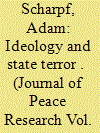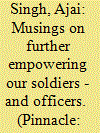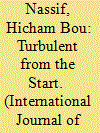|
|
|
Sort Order |
|
|
|
Items / Page
|
|
|
|
|
|
|
| Srl | Item |
| 1 |
ID:
158212


|
|
|
|
|
| Summary/Abstract |
How does ideology influence state terror? Studies on state repression have looked at the leaders’ decisionmaking to explain how much violence states use against internal enemies. However, government leaders usually rely on their security forces to produce violence. I argue that distinct ideological beliefs within the military apparatus produce different levels of repression even if leaders are determined to terrorize the population. I expect officers who share the ideology of their leader to willingly execute the government’s repressive program, while officers who do not share the leader’s convictions refuse to terrorize civilians. I study these dynamics in the case of Argentina’s Dirty War (1975–81) during which the government tasked its ideologically divided army with a nationwide terror campaign. Combining qualitative and quantitative data from historical sources, I identify the ideological beliefs and repressive behavior of military commanders. Consistent with my expectation, I find that loyal nationalist officers in the infantry, artillery, and communications branch of the army perpetrated significantly more violence than liberal cavalry officers who rejected the junta’s terror program. The results demonstrate that ideological beliefs within the state’s security apparatus can lead to violent outcomes that deviate from government orders.
|
|
|
|
|
|
|
|
|
|
|
|
|
|
|
|
| 2 |
ID:
164879


|
|
|
|
|
| Summary/Abstract |
Japanese imperialism was one of the most important driving forces in the history of modern East Asia. One influential group of actors at the grassroots level were the so-called ‘continental adventurers’ (tairiku rōnin)—Japanese nationals who travelled in Korea and China on the lookout for adventures and employment opportunities. Some of them worked part time for the army as spies, translators, and agents for special operations. These adventurers have been studied before as agents of Japanese imperialism, but existing accounts fail to present a convincing model of the mechanism that made their activities effective. The goal of this article is to fill this gap.
This mechanism, which I shall hereafter call ‘the military-adventurous complex’, was a lobby of officers, continental adventurers, businessmen, politicians, criminal elements as well as Chinese, Manchurian, and Mongolian revolutionaries. The interests of these contingents were unique but nevertheless intertwining. Despite its decentralized character, the military-adventurous complex had a significant impact on Japanese foreign policy over an extended period. In this article, we shall explore the contours, structure, and modus operandi of that complex, its ambivalent relationship with the Japanese state, as well as several examples of its operations in the early twentieth century. Finally, we shall dwell on the ramifications of the complex on the development of Japanese imperialism.
|
|
|
|
|
|
|
|
|
|
|
|
|
|
|
|
| 3 |
ID:
142322


|
|
|
| 4 |
ID:
114031


|
|
|
|
|
| Publication |
2012.
|
| Summary/Abstract |
In Fall 2010, the last group of students enrolled in the Russian Military Academy of the General Staff (MAGS). This important military educational institution, which has existed in some form or another for almost two centuries, will cease to exist as an academy in 2012. This research note provides a description of graduates of the MAGS, utilizing survey data collected between 2000 and 2008. This data revealed key sociodemographic characteristics of MAGS students as well as service motivations and value sets.
|
|
|
|
|
|
|
|
|
|
|
|
|
|
|
|
| 5 |
ID:
174495


|
|
|
|
|
| Summary/Abstract |
This article reconsiders military politics in Syria prior to the 1963 Baʿthi power grab in light of new sources. I undermine the presumptions that Baʿthi tactics of sectarian favoritism in the armed forces were unprecedented in post-independence Syria. I make the following arguments: first, attempts by the Sunni power elite to tame Syrian minorities were part of a broad sequence of events that spanned several regimes and informed politics in the Syrian officer corps; second, the various military strongmen who ruled Damascus intermittently from 1949 until 1963 distrusted minority officers and relied mainly on fellow Sunnis to exert control in the armed forces; and third, the combination of minority marginalization in Syrian politics and Sunni preferentialism inside the armed forces bred enmity and polarized sectarian relations in the officer corps.
|
|
|
|
|
|
|
|
|
|
|
|
|
|
|
|
| 6 |
ID:
183745


|
|
|
|
|
| Summary/Abstract |
This article reconsiders the 1960 coup in Turkey, paying particular attention to the interactions and power relations in play, both within the army and between the army and civilians. I argue that the 1960 coup, rather than being an example of the military resolving a political crisis, is better understood as the army exploiting a social context which lent itself to portraying the use of force against the government and its allies as legitimate. First, I show that the 27 May coup consisted in dissident officers exploiting a context to push through sector-specific demands. Second, I depict the instability constituting the period of military administration and the following months. This enables me to show how the general staff, drawing on the support of civilian political actors, managed to re-establish the army’s hierarchy and stabilize its internal power relations. Finally, I analyze how the military institution managed to impose its authority over civilians during the years following the 1960 intervention, thanks to the judicial, economic, and institutional autonomy it acquired as of this first coup
|
|
|
|
|
|
|
|
|
|
|
|
|
|
|
|
|
|
|
|
|